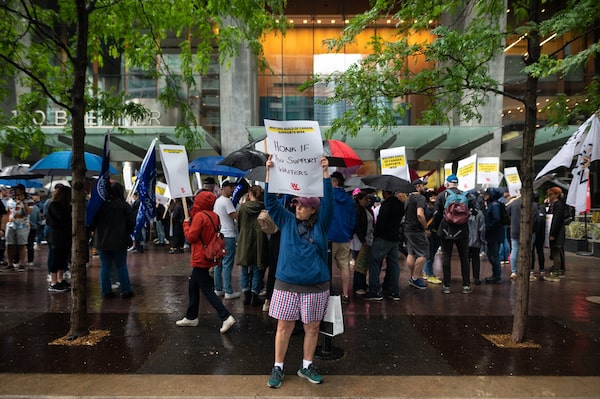
Members of the Writers Guild of Canada gather outside the office building for both Amazon and Apple for a rally in support of U.S. screenwriters in downtown Toronto, on June 14, 2023.Tijana Martin/The Canadian Press
The Writers Guild of Canada has reached an agreement with Canadian screen producers that will avoid a countrywide strike if its 2,500 English screenwriters choose to ratify the deal.
Union members overwhelmingly voted to authorize a strike late last month in a push for pay boosts and greater staffing minimums, as well as protections against generative artificial intelligence models that could circumvent their creative work. Though the group did not strike immediately, its members planned to use the result to affirm their bargaining position. It was the first strike authorization in the union’s 33-year history.
The English-language screenwriters union and the Canadian Media Producers Association did not share details on the end of their negotiations, except to say in a joint statement issued early Tuesday that they had reached an agreement in principle. The three-year agreement must now be ratified by both parties.
It was not clear when screenwriters would vote on the new details or when they would be made public.
The union, which represents writers, story editors and story consultants, has been negotiating with the producers since before their most recent Independent Production Agreement expired at the end of December.
“We feel the new agreement includes important protections for Canadian screenwriters and balances the concerns of our producer partners,” Victoria Shen, the union’s executive director, said the joint press release.
Sean Porter, the CMPA’s vice-president of national industrial relations, added that the agreement “values the important alliance that exists between Canadian screenwriters and independent producers.”
After the strike vote result was announced in April, Writers Guild president Alex Levine said that members’ priorities in negotiations were boosted compensation from producers, particularly for animation writers’ upfront script fees; increased minimum staffing on shows, particularly once they are in production; and protections for creative work against AI.
Pay and AI were at the heart of last year’s Hollywood labour disputes, which included a months-long strike by the Writers Guild of America. Creatives across the film sector have been seeking protections for genuine human expression in the face of rapidly maturing generative AI services – which, in the screenwriting world, could be used by producers to augment some or all of the creative process, including the creation of drafts.
Canada’s screenwriters also must live with the might of the sector’s American hegemony. In a filing with the Canadian Radio-television and Telecommunications Commission last year, the guild warned that the country needs to find ways to protect and fairly finance Canadian storytelling – particularly in an era when the broadcaster licence fees that fund domestic programming face a “stark decline.” In the past five years, the guild said in 2023, its members saw their aggregate earnings decline by about 22 per cent when adjusted for inflation.